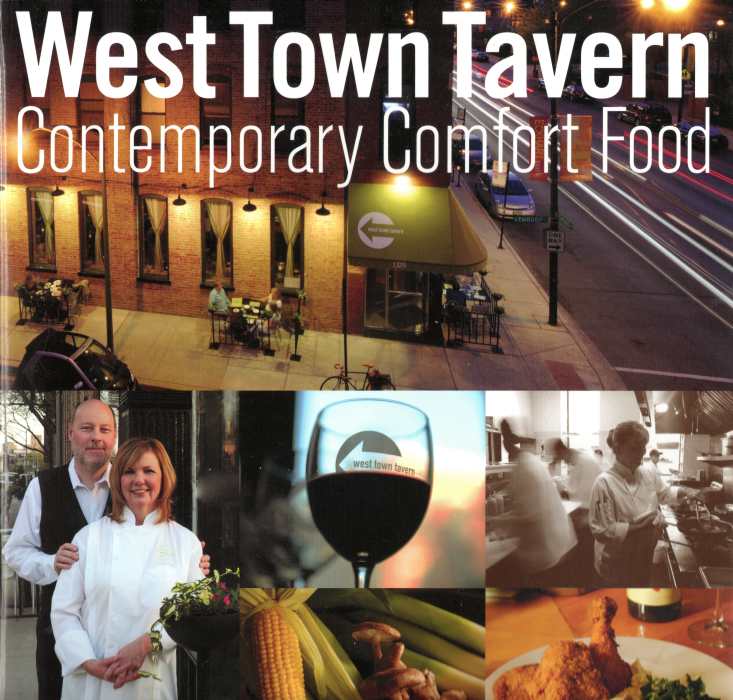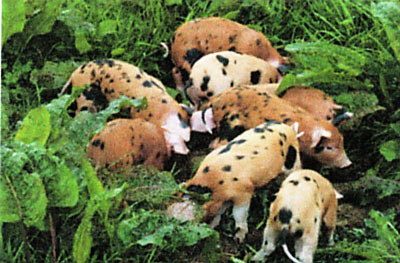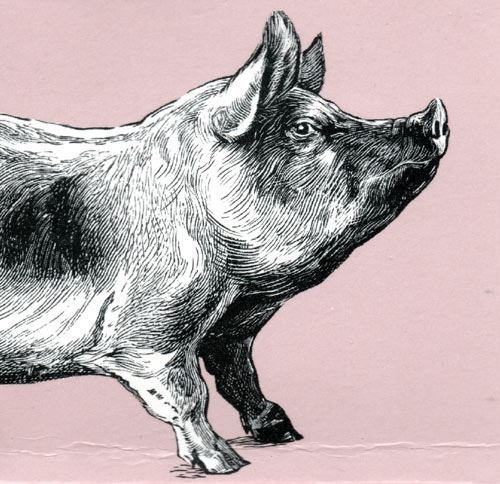The West Town Tavern in Chicago continues to thrive & thrill, with a little help from Becker Lane Organic Farm.
1. The way of the Midwestern colossus.
The Editor has been enamored of the West Town Tavern in Chicago for years, and nothing about a recent visit changes anything. Susan Goss, the chef in her kitchen open to the dining room, and husband Drew, who works the front of the house, deserve endorsement, even if they do not lack for business.
The place itself is small and crowded, even to Manhattan extremes, but the compression breeds conviviality and the staff navigates the narrow passages with acrobatic ease. They do more than that; they are efficient, friendly, informative, discrete and they remember you.
The setting is warm and timeless. Bare brick walls all around; tall windows in plain wood frames lined with warm red drapes; big shallow cabinets holding primitive artwork along the interior wall; and a brilliant barback fashioned from ruined cabinetry stripped of its glass. This is the aura of Chicago at its best, urbane and unpretentious.
Local ingredients have been a priority for the Gosses from day one, and now they can source regional spirits too, including the sprightly gin and crisp vodka from Death’s Door in Michigan.
The Tavern offered a seasonal menu before seasonal menus proliferated elsewhere in a storm of sustainability; this restaurant’s devotion to the cult still serves it well. The Gosses also have maintained an ongoing curiosity about all things food and wine. In their cookbook, West Town Tavern: Contemporary Comfort Food, Mr. Goss says of his wife that the “amount of time she spends thinking and reading about food is staggering” but their book neither discusses her sources nor offers its reader a bibliography. Theirs is not that kind of book. Its prose is plainspoken and its intent is either foolhardy or fearless, for if you follow its recipes you can come close to the quality that you will encounter consistently at the restaurant itself.
And the recipes are easy to follow, even for the inexperienced cook. Information for the uninitiated includes some thirty-three pages of basic advice about techniques including knife skills, food safety and ingredients along with foundational recipes ranging from sauces and stocks to cornbread and braised beans.
If Ms. Goss does not pause to disclose her influences or pretend to define her food, her husband explains that her “gift is coaxing the flavor out of everything” and that indeed is what she does. (Goss 10) How could anyone offer any cook higher praise?

A winter night outside the West Town Tavern.
A lot of the coaxing targets ordinary ingredients like short ribs of beef and shoulder of lamb. Their sauces and seasonings can be imaginative in the sanest sense. Not that the dishes at West Town are complicated; instead, their composition is smart and aims to pull up the flavor of the cut in question. The same quiet genius informs everything else, from beer cheese and soup to vegetables; the Brussels sprouts, for instance, sing and customers clamor for them. If the Midwest has a developed an identifiable cuisine then this is it.
How, the discerning reader may muse, does anything at the West Town Tavern involve British cuisine? A fair question, and one that the Gosses themselves might ask. If, however, they would be surprised to find their food described as British, it does include elements of traditional technique from the archipelago. That beer cheese is a tweaky but recognizable version of potted cheese, sprouts of course have a greater association with Britain than anywhere else--the adjective refers to Queen Victoria’s Albert, a Belgian who relished the little globes--and the Gosses’ use of contrasting flavors in things like sour sauces are characteristic of traditional British combinations.
West Town is known for its pot roast (actually short ribs) with black vinegar sauce and, although the braised ribs are close to irresistible, it is worth ordering the rest of the selections on the menu. Fennel, incidentally one of the oldest vegetables cultivated in Britain, anchors a winter salad that includes other greenish shavings, bacon and more. It is as good a salad as any the Editor has tried. Ms. Goss cooks the freshwater fish indigenous to the midwest, like perch and smelts, that most eastern restaurants ignore, and posts good specials every night.
2. Becker Lane Organic Farm and ‘the English System.’
Which brings us, happily enough, to the subject of pork chops. Many of us have read a great deal about the revival of heritage pigs, and serious restauranteurs vie to scoop supplies of their meat at the expense of the competition. Sometimes the heritage is Spanish, but most of the prized artisanal pigs descend from British stock.
Unhappily, the Editor seldom has found restaurant dishes derived from heritage breeds any better than the run of decent everyday pork. Granted that mainstream pork is not what it was; it has become deracinated to satisfy the popular fetish for ultralean meat, and as a result loin is very nearly useless anymore. Chops pose a particular challenge because they often dry to the point of drab and dusty.

At the late lamented Savoy in Manhattan, a special tasting dinner that cooked an entire Ossabaw pig showed the Editor nothing of note. Chops in London, fresh and smoked, made from Gloucester Old Spot, Tamworth and other breeds have ranged from ordinary and relatively tough (fresh, at St. John) to inordinately salty and tough (smoked, at Hix Oyster & Pie). Husk, the extraordinary restaurant in South Carolina, has served the Editor a chop that was a little firm and… ordinary, not that it was bad.
The chop at the West Town Tavern demonstrates not the ordinariness of heritage pork but rather that these other places have misfired. In terms both of flavor and texture it was, hands down, the best pork the Editor has tasted, and cost considerably less than its enumerated counterparts.
The source of the West Town chop was the Becker Lane Organic Farm in Dyresville, Iowa. Their meat is highly prized, and sought out by no less an advocate of sustainable good food from humane producers than Michael Pollan. It turns out that Becker Lane is no secret, and any number of Chicago restaurants boast that their pork originates there.
As the farm’s website explains, the organic food movement began to influence producers as well as consumers during the 1990s, initially in England:
“It wasn’t long before some in England began to tout the importance of traditionally reared livestock as an attractive throwback approach to what had now become the dominant conventional method. People suddenly awoke to the past and memories of ‘good tasting’ pork from farms with methods that were less controversial.” (beckerlane)
To satisfy both the demand for better meat and a spreading concern about the welfare of animals, English farmers developed a system for rearing pigs outdoors in humane conditions all the year round. By housing them in insulated huts while allowing them to range in pasturage, sows could bear piglets even in winter so that supply was not limited to a segment of the calendar and the sale of heritage pork became economically viable. The practice became known within the industry as the ‘English System.’
It is impressive, even moving, to observe how seriously a number of midwestern farmers took their decision to adopt this new mission at the turn of the century:
“In 2003 a group of niche pork enthusiasts sent a contingent of farmers, university researchers, food industry specialists and meat scientists to Northern Europe to study the production of niche pork there. On this trip the English system which at that time had spread to Denmark and Sweden was viewed for the first time.” (beckerlane)

The following year, Becker Lane implemented the English System and have been using it to raise heritage pigs ever since.
Becker Lane imports most of the equipment that the farm uses to produce its organic pork from England. As Jude Becker explains, England remains the epicenter of professional organic pork production, although it would be hard to believe that anything produced there beats the pork from Becker Lane. (Becker)
Mr. Becker rears hybrid pigs descended from a Berkshire sire and Chester White sow, traditional English breeds, in what appears to be a nearly idyllic setting, both for pig and man. The serried rows of insulated huts that shelter their pigs would do any urban designer proud.
3. Back to Town.
The Editor’s chop at the West Town Tavern was a porterhouse cut, a T-bone dividing loin and tenderloin. Ms. Goss sauced the chop with a reduction of stock and Chardonnay, then served it with those famous sprouts alongside potatoes au gratin, a welcome throwback.
This was a deft and memorable composition of high order. Heritage pork is not the pallid and tasteless ‘other white meat’ of the PR people--it has the redder tones that pork should have--but pork works best with white wines. The Gosses may not be alone in understanding that affinity, but they reside with the minority that does, further evidence of their thoughtful approach to the craft. The Editor usually chooses Riesling, but the richer Chardonnay married better with the caramel sprouts and hearty potatoes.
The wine list itself reflects an imaginative eye for value and even (hallelujah) includes a dry Sherry, the estimable Manzanilla from Lustau. Otherwise, favorite bottles pepper the list; Marlborough Sauvignon blanc, Oregon Pinot Gris, a Corvina from the Veneto. The West Town Tavern unfortunately has no taps but does offer a few indigenous craft beers by the bottle.
We were too sated for dessert but did not want to leave this haven for the Chicago cold so lingered at the bar over conversation and Maker’s Mark. It is that kind of place.
Recipes based on West Town Tavern beer cheese, pot roast and Brussels sprouts appear in the practical.
Sources:
Jude Becker, correspondence to the Editor (1 March 2012)
Susan Goss with Drew Goss, West Town Tavern: Contemporary Comfort Food (Chicago 2010)

